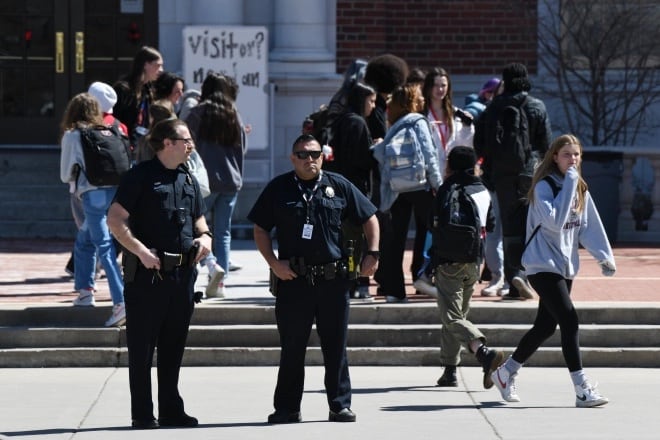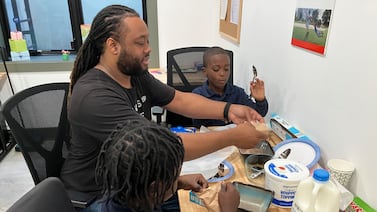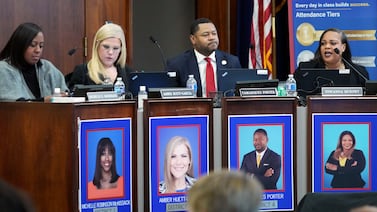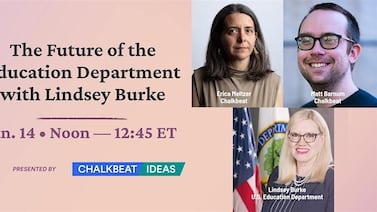The Denver school board is divided on whether to keep police officers on campuses, with two competing proposals on the board agenda for Thursday.
One proposal, authored by board member Scott Baldermann, would give the superintendent authority to decide when, where, and for how long police should be stationed in Denver school buildings. School communities would be informed and their opinions considered, the proposal says, but the decision would rest with the superintendent.
The superintendent would deem when police presence is necessary and would work to ensure officers don’t get involved in school discipline and have special training and certifications, the proposal says.
The proposal says that police should be in schools for preserving safety, deterring crime, mentoring students, and building community and that they should have a softer presence, wearing less formal uniforms and not parking their cars where students would have to walk around them.
Baldermann, who voted to remove school resource officers back in 2020, said he changed his position due to the number of weapons being confiscated in Denver schools and feedback he has heard from the community.
He hopes his proposal will provide safety benefits and deter students from taking weapons to school without leading to more tickets and arrests for students of color — the reason advocates wanted police out of schools in the first place.
“At the end of the day, I do want this to be a positive relationship, and I think we can do that,” he said.
The other proposal, authored by Vice President Auon’tai Anderson and endorsed by members Scott Esserman and Michelle Quattlebaum, says police should not be stationed in schools — district- or charter-managed — on a regular basis. Instead the district would develop a memorandum of understanding with the city to create community resource officer positions.
Those officers would be assigned by region and available to schools when necessary. Their role would be limited to protecting the physical safety of students and staff, responding to a threat from someone outside the school community, and responding to situations in which schools are required to call law enforcement. The memorandum would include guidelines for when it’s appropriate for police to be on school grounds and when school staff should handle a situation, the proposal says.
Anderson’s proposal says that any officer engagements with students should include district support staff, restorative justice workers, and if needed a special education caseworker to help de-escalate the incident and intervene without criminalizing students.
Anderson said during a news conference Wednesday that the proposal represents a middle ground. The district won’t place police officers in schools but schools will have a police presence when needed.
“We cannot turn back on the progress that we have made,” he said.
While Baldermann’s proposal calls for officers to be trained by the National Association of School Resource Officers, Anderson lays out more extensive training requirements with curriculum to be developed by community groups. Topics would include restorative practices, culturally responsive de-escalation, working with students with disabilities, trauma-informed approaches, racial equity, and the school-to-prison pipeline.
Both proposals call for not spending school district funds on school resource officers. Instead, the city, state, or grants should cover police salaries, the proposals say.
The school district cannot unilaterally compel the city or the police department to agree to its terms.
Anderson said he’s spoken with Denver Police Chief Ron Thomas about the proposal. Questions remain about details of the memorandum of understanding, such as officers’ duties, the number of officers, and school assignments, Anderson said.
Baldermann said he hasn’t talked with the police chief, but he hopes the department would find the guidelines he’s proposing reasonable.
The role police will play in Denver schools is a significant question as Superintendent Alex Marrero develops a new safety plan that also emphasizes mental health resources for students, after-school programming, and community partnerships. Last week, in a second draft of the plan, he asked the school board to adopt a districtwide policy rather than leave the decision up to school principals in consultation with teachers and parents.
The Denver school board voted unanimously in March to temporarily return armed police officers to high schools the day after a student shot and wounded two administrators inside East High School. That decision reversed a ban adopted in 2020 in the aftermath of George Floyd’s murder in Minneapolis. Anderson was the leading advocate for removing police from schools.
The district was supposed to develop a new agreement with the Denver Police Department, but that never happened.
Without police on campuses, tickets and referrals to law enforcement fell, a major goal of advocates who pointed to significant racial disparities in student interactions with police.
Since then, rising community violence, more weapons being found on school grounds, and three prominent shootings in or near East High School — including one in which a student was killed — all pushed questions of school safety, discipline, and school resource officers to the forefront.
For the last two months, 13 Denver campuses have had school resource officers. Community surveys have found parents, students, and educators all divided on whether the presence of police would make schools feel safer. Advocacy groups like Movimiento Poder have urged the district not to return police to campuses, while many school principals say they would prefer to have officers in their buildings who know and are familiar with their students.
Board member Esserman, who supports not putting police back into schools, said the district shouldn’t switch its approach every time an incident occurs.
“When we do that, we’re just swinging a pendulum back and forth,” he said. Instead, the change will modify the district’s approach to keeping cops out of schools while also getting cops more involved with the city’s communities, he said.
Baldermann said those pendulum swings are one reason he wants the superintendent to make the decision on an as-needed basis.
“Right now, the board was saying you can’t do this, and Dr. Marrero did it anyway,” Baldermann said. “If there is a known threat or intelligence from the community, the superintendent should be able to respond. The board does not need to be involved in the operational level of where and when and how long.”
School Board President Xóchitl “Sochi” Gaytán said that as she’s met with Latino community groups, the large majority — especially mothers — want to see police in schools provided they have training and understand the community and its culture.
“It’s important we all come to the table with an open mind, that we come from the heart as well as bring analytical and critical thinking skills to determine what the best route is with this divisive SRO issue,” she said.
This article has been updated throughout with quotes from school board members.
Jason Gonzales contributed to this article.
Bureau Chief Erica Meltzer covers education policy and politics and oversees Chalkbeat Colorado’s education coverage. Contact Erica at emeltzer@chalkbeat.org.







